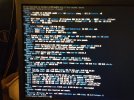Well, how about trying the method (currently provided for testing, but once it is considered OK, it would be official) described in
comment #36 of the thread Possible solution to the drm-kmod kernel mismatch after upgrade from Bapt? Other posts in the same (2nd) page would be helpful, too.
A bit different, but the essential point is to create
/usr/local/etc/pkg/repos/FreeBSD-kmods.conf with the contents below.
Code:
FreeBSD-kmods: {
url : "pkg+https://pkg.freebsd.org/${ABI}/kmods_latest_${VERSION_MINOR}",
enabled : yes,
priority : 10,
mirror_type : "SRV",
signature_type : "FINGERPRINTS",
fingerprints : "/usr/share/keys/pkg"
}
This way, newly added repository for kmod pkgs only should be preferred over usual (pre-defined) repo and anything not there shoule be looked for in usual repo. priority is not necessarily to be 10. Value above 0 (i.e., 1 or 100) would be OK, too.
If you're sticking with quarterly (the default for any releases like 14.2-Release,
kmods_latest_${VERSION_MINOR} above should be replaced with
kmods_quarterly_${VERSION_MINOR}.
As I myself am building almost all pkgs locall, I've not tried the above.
But I have configuration for my local repo and overriding usual repo using priority.
Possibly, when pkgs at the usual repo are built later than kmod repo, there remains a risk that pkgs at usual repo is preferred.
In this case, the workaround described in above-linked post would help.

